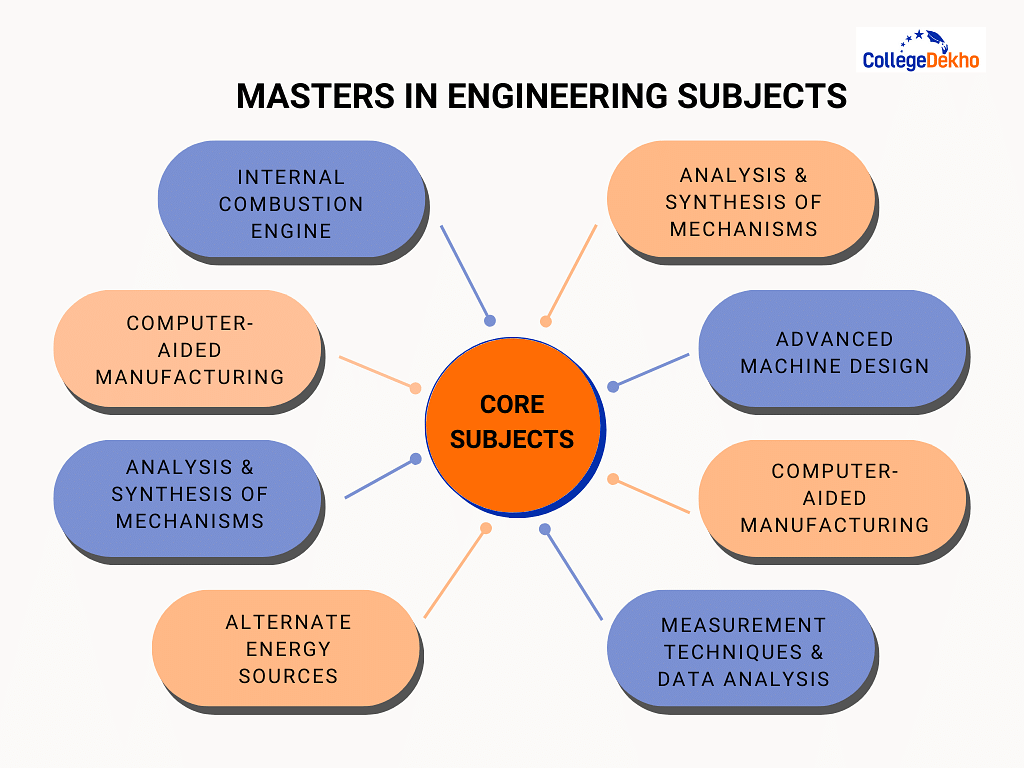Masters in Engineering Syllabus & Subjects 2024
Masters in Engineering Syllabus Overview
Masters in Engineering syllabus focuses on thorough engineering research. The overall course duration is two years divided into four semesters. Through this course, candidates receive professional training as well as theoretical expertise in advanced engineering concepts. The ME programme includes both core and optional studies. The course includes fundamental courses that are shared by all specialties of the Master of Engineering programme. Masters in engineering syllabus includes Computer-Aided Manufacturing, Advanced Machine Design, Internal Combustion Engine, Measurement Techniques & Data Analysis, Analysis & Synthesis of Mechanisms, and Theory of Elasticity & Plasticity.
These disciplines are regarded as critical in creating the groundwork for the engineering field. The optional topics make the curriculum flexible and varied. Students in masters in engineering course structure include class lessons, practical lab workshops, projects, seminars, research projects, field trips, etc. Read the full post to get details on masters in engineering syllabus and subjects.
Table of Contents
- Masters in Engineering Syllabus Overview
- Stream Wise Masters in Engineering Syllabus
- Masters in Engineering Subjects
- Masters in Engineering Common Subjects for All Semesters
- Masters in Engineering Optional Subjects
- Masters in Engineering Lab Subjects
- Specializations Offered in Masters in Engineering
- Syllabus for Masters in Engineering Distance Programs
- Masters in Engineering Entrance Exam Syllabus
- Masters in Engineering Important Books
- Masters in Engineering Course Structure
- FAQs about M.E Syllabus
Stream Wise Masters in Engineering Syllabus
There are various streams available for masters in engineering programmes. Candidates can select their stream for their master’s degree depending on their interests. A master's degree in engineering adds more to student credibility and increases their knowledge. In addition, by pursuing a master's in engineering candidates will get better career opportunities and aid them in promotions and earning a lucrative salary.
Check the stream-wise masters in engineering course and their syllabus topics given below.
| Stream | Syllabus |
|---|---|
| ME Environmental Engineering |
|
ME in Petroleum Engineering |
|
ME in Aerospace Engineering |
|
ME in Nanotechnology Engineering |
|
ME in Geological Engineering |
|
ME in Systems Engineering |
|
ME in Print Technology and Engineering |
|
| ME in Industrial Engineering |
|
ME in Agricultural Engineering |
|
ME in Material Science Engineering |
|
Note- The masters in engineering syllabus given above consist of only a few subjects and the original syllabus includes 4 semesters and several other subjects.
Quick Link: Reasons to pursue MTech after BTech
Masters in Engineering Subjects
The Master in Engineering course subjects are designed to expose students to all aspects of engineering and science. The ME curriculum divides subjects into core and elective categories. The core subjects are those that are deemed necessary for students' learning. The elective subjects are those that add flexibility and variety to the coursework.
- Internal Combustion Engine
- Analysis & Synthesis of Mechanisms
- Computer-Aided Manufacturing
- Advanced Machine Design
- Analysis & Synthesis of Mechanisms
- Computer-Aided Manufacturing
- Alternate Energy Sources
- Advanced Robotics
- Measurement Techniques & Data Analysis
- Theory of Elasticity & Plasticity

Also read: Top 6 Master's Degree Programs for Indian Students to Study
Masters in Engineering Common Subjects for All Semesters
The masters in the engineering course syllabus are structured in such a way that each semester covers a different topic and some repetitive topics, ensuring that students fully understand and comprehend important topics that will be useful in their careers. Certain master's in engineering course subjects are repeated across several semesters to make sure students understand these subjects well.
Masters in Engineering Optional Subjects
The master’s in engineering is a postgraduate degree that includes core and optional subjects. An optional subject sometimes known as an elective subject is not a compulsory subject unlike core subjects). Candidates have the option of studying optional topics. If a candidate's course requires them to select electives, they will find a list of alternatives in their study plan. Students can select a few electives from a list of optional subjects at the university that interests them.
Following are some of the masters in engineering optional subjects.
- Elective I
- Elective II
Note- Each college provides its own master's in engineering optional subjects list which might vary from one college to another.
Also read: Is it worth doing BCA course?
Masters in Engineering Lab Subjects
A few lab courses are included in the masters in engineering curriculum to allow students to apply what they have learned in theoretical lectures to real-world conditions. The institutions' mix core and optional topics with a few lab courses and practical workshops to provide students with technical capability. The lab courses also provide students with technical knowledge and real-world job experience that will be beneficial when they begin working professionally.
Check out the master's in engineering lab subjects given below.
- Laboratory Practice I
- Laboratory Practice II
Quick Link: Top Private M.Tech Colleges in India
Specializations Offered in Masters in Engineering
There are numerous specializations available to students under the masters in engineering program. These specializations are essential for students to comprehend any specific area of interest in great detail and depth. There are several specialties in masters in engineering from which applicants can pick based on their interests and the professional route they intend to pursue. There are specializations in master’s in engineering courses available, allowing students to obtain competence in their chosen subjects of study and pursue a career in that particular engineering sector.
Go through the master's in engineering specialization given below-
- ME in Environmental Engineering
- ME in Material Science Engineering
- ME in Aerospace Engineering
- ME in Print Technology and Engineering
- ME in Agricultural Engineering
- ME in Nanotechnology Engineering
- ME in Manufacturing Engineering
- ME in Systems Engineering
- ME in Geological Engineering
- ME in Petroleum Engineering
- ME in Civil Engineering
- ME in Industrial Engineering
Syllabus for Masters in Engineering Distance Programs
Some institutes in India offer masters in engineering in distance mode. Candidates who are working professionally and can't give full time to a master in engineering degree can pursue the distance programme. Opting for a distance program is also considered by students when they can't relocate geographically. The distance program's masters in engineering course syllabus and contents are comparable to those of a full-time programme. The master's in engineering curriculum for the distance programme may differ from institute to institute.
Quick Link: Best engineering courses
Masters in Engineering Entrance Exam Syllabus
Admission to the masters in engineering programme is done via entrance exams majorly. These engineering entrance exams are conducted at the university, national, and state levels by various boards. To qualify for the master's in engineering programme, the candidate must understand the syllabus of these exams very well and score the cutoff marks. Candidates can check the masters in engineering course syllabus for entrance exams given below.
| Exam Name | Syllabus |
|---|---|
| KEAM | KEAM Syllabus |
| JEE Advanced | JEE Advanced Syllabus |
| GATE | GATE Syllabus |
| JEE Main | JEE Main Syllabus |
| HP CET | HP CET Syllabus |
| GCET | GCET Syllabus |
| AP EAMCET | AP EAMCET |
| WBJEE | WBJEE Syllabus |
| GRE | GRE Syllabus |
| JKCET | JKCET Syllabus |
Note- There are several other masters in engineering entrance exams also and their syllabus is released by the respective exam conducting authorities on their official website.
Masters in Engineering Important Books
When pursuing a Master of Engineering degree, students should select the best books for preparation. These best books can assist students in understanding the curriculum and subjects. Furthermore, these books assist students in performing well on the course and exam. Exam toppers and education experts frequently advised choosing the top author's book since it provides a better understanding of the contents. Furthermore, the greatest books will help you comprehend each topic thoroughly and achieve high exam scores.
Check out the best masters in engineering books for preparation given below.
| Book Name | Author |
|---|---|
| Concepts of Physics (Part I & II) | HC Verma |
| Organic Chemistry | OP Tondon |
| Elements Of Mechanical Engineering | Sadhu Singh |
| Concise Inorganic Chemistry | JD LEE |
| Higher Algebra | Hall and Knight |
| A Textbook Of Fluid Mechanics And Hydraulic Machines | RK Bansal |
| The computer networking: A top-down Approach | James F. Kurose and Keith W. Ross |
| Superintelligence: Path, Dangers, Strategies | Nick Bostrom |
Masters in Engineering Course Structure
The Masters in Engineering teaching methodologies and techniques include traditional classroom instruction as well as practical lab workshops. Students in the master's in engineering course learn about the fundamentals of engineering and technology for the first two semesters. Students are introduced to subjects related to their specialization beginning in the third semester. Classroom-based instruction allows students to learn about topics in great depth and detail, as well as to ask any questions they may have. The practical lab workshops conducted in master in engineering courses allow students to apply their knowledge in a real-world setting.
When taking a Master in Engineering course, students must complete a research project at the end of their education as part of the curriculum. This Masters in engineering research project allows students to learn about all the topics in great depth and detail. This research topic also assists professors in assessing students' comprehension.
Quick Link: top engineering colleges in India
FAQs about M.E Syllabus
What is masters in engineering syllabus?
Masters in engineering syllabus contains subjects such as advanced machine design, measurement techniques & data analysis, internal combustion engine, analysis & synthesis of mechanisms, computer-aided manufacturing, and theory of elasticity & plasticity.
Which are the best Masters in Engineering Books?
A Textbook Of Fluid Mechanics And Hydraulic Machines by RK Bansal, The Computer Networking: A Top-down Approach by James F. Kurose and Keith W. Ross, and Superintelligence: Path, Dangers, Strategies by Nick Bostrom are some of the best choices in masters in Engineering books.
What is Masters in Engineering Course Structure?
The internal combustion engine, analysis & synthesis of mechanisms, computer-aided manufacturing, advanced machine design, analysis & synthesis of mechanisms, computer-aided manufacturing, alternate energy sources, advanced robotics, measurement techniques & data analysis, theory of elasticity & plasticity are the subjects contained in the masters in engineering syllabus.
What is masters in engineering specialization?
Environmental Engineering, Print Technology and Engineering, Nanotechnology Engineering, Material Science Engineering, and Industrial Engineering are some of the masters in engineering specializations.
Which are the core masters in engineering subjects?
Thermal Engineering, Design (Machine and Mechanical), Manufacturing and Production, and Industrial Engineering are some of the masters in engineering core subjects.
Which are the top masters in engineering projects?
Advanced Robotics, Computational Fluid Dynamics, Process Equipment Design, Alternate Energy Sources, Design of Heat Exchanger, and Design of Pumps & Compressors are some of the top masters in engineering projects.
Which are the top masters in engineering core subjects?
Advanced Machine Design, Measurement Techniques & Data Analysis, Internal Combustion Engine, Analysis & Synthesis of Mechanisms, and Computer-Aided Manufacturing are some of the top masters in engineering core subjects.
What is the best master's for engineering?
Masters in Engineering (MEng), and Master of Science in Engineering (MSE), are some of the best master's for engineering courses in India.
What is MS degree in engineering subjects?
The MS degree in engineering subjects covers domains covering Master of Science in Civil Engineering (MSCE), Master of Science in Mechanical Engineering (MSME), Master of Science in Electrical Engineering (MSEE), Master of Science in Chemical Engineering (MSChE), Master of Science in Aerospace Engineering (MSAE), etc.
What is Masters in Engineering first year syllabus?
The Masters in Engineering first year syllabus includes topics related to advanced fluid mechanics, mechanical vibration, advanced heat transfer, theory of elasticity and plasticity, alternate energy sources, advanced machine design, etc.
Which are the Masters in Engineering Subjects?
Internal Combustion Engine, Analysis & Synthesis of Mechanisms, Computer-Aided Manufacturing, Advanced Machine Design, Analysis & Synthesis of Mechanisms are some of the masters in engineering subjects.
Popular Courses
M.E Colleges in States
M.E Colleges in Cities
- Courses
- Masters in Engineering
- Syllabus


















